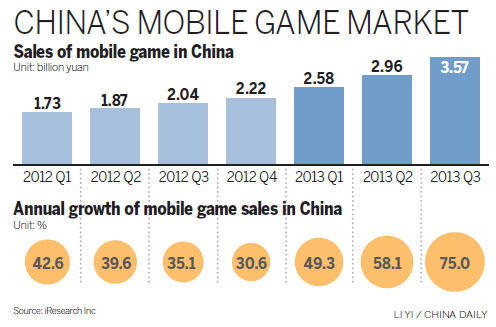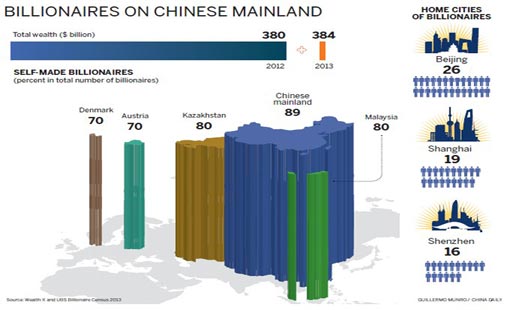Cyber cafe waiter turned entrepreneur
Updated: 2013-12-26 08:15
Lyndon, who speaks fluent English and is in charge of all the company's overseas business, tried the first three studios but all failed initially. "Fruit Ninja became our last and only chance," he said.
Although there were many Chinese companies wanting to bring Fruit Ninja to China, iDreamsky stood out because of its unique pitch. "Many competitors promised them money and high returns As a small company, which didn't have much in the way of capital resources, we promised them that we would help build up the game's brand in China and, surprisingly, they bought it," Lyndon said, adding that his company was the only Chinese company that flew to Australia to do a face-to-face proposal, which also proved to be a valuable tactic.
It turned out that it was a wise decision for Western mobile game developers to tap into the Chinese market in 2011 because it was not mature and therefore there was not much competition. The good timing made Fruit Ninja a big hit in China in 2012 and its success of Fruit Ninja led to the success of iDreamsky.
The days that it courted game developers and begged for their exclusive dealership rights in China are over for iDreamsky. About 600 mobiles games turn to the company every month, hoping to be published by them.
Compared with two years ago, the Chinese mobile game market has now taken off to an extraordinary degree. With China being the largest smartphone market in the world, iResearch Consulting Group, an Internet market consultancy, predictes revenues from mobile games would reach 9.19 billion yuan ($1.5 billion), this year, up 371.1 percent from 2012.
According to Niko Partners' 2013 Chinese Mobile Games Market Report, the number of gamers in China is expected to jump to 288 million in 2013 from 192 million in 2012. In 2014 there will be 390 million - more than the total population of the US.
Lyndon said that China's mobile game market will continue its boom in the coming three years with the increasing penetration of smartphones in the country, the building of the fourth-generation network and the falling prices of high speed mobile data packages.
However, he also predicted that the window for Western game developers to break into China's market is closing because of the rise of South Korean and Japanese game developers.
"The quality of (South) Korean, Japanese and Chinese mobile games has been increasing rapidly. And because of the proximity of cultures, (South) Korean and Japanese games are more suitable for the tastes of Chinese players," Lyndon said.
To prepare for the change, iDreamsky has already signed Cookie Run, a top game in Korea and Sonico Dash, one of the most popular game brands in Japan. Lyndon said that his company has worked on the localization of the two games and plans to launch them in China in 2014.
Despite the fact most of the games iDreamsky has brought into China are big in their home countries, it doesn't mean the company makes easy money.
Lyndon said in Fruit Ninja, iDreamsky added Chinese blades for cutting the fruit and localized backgrounds. In Temple Run, the company had to optimize the Western monetization strategy, which asked players to buy virtual gems to revive their character.
In the Chinese version, players can revive their character either by buying virtual gems or directly paying two yuan. Lyndon said it is all about impulsive buying behavior.
He is confident the launch of Cookie Run and Sonico Dash will help iDreamsky continue to secure its leading position in the mobile game industry in 2014.
Lyndon refused to reveal iDreamsky's revenue, but he said that the combined monthly revenues of Fruit Ninja and Temple Run exceed 50 million yuan. According to China Mobile Games and Entertainment Group Ltd's most recent financial report, the Nasdaq-listed company reported revenue of about 98 million yuan between July and September.
Lyndon said money is not a big issue for iDreamsky, while admitting that the mobile game market in China is changing rapidly with a new batch of competitors.
Apart from companies such as China Mobile Games and Entertainment Group Ltd, which both develops and publishes games, Tencent Inc, whose mobile chatting app WeChat has more than 400 million users, has also developed its own games and gained an increasing share of gamers on its service.
Lyndon said there will always be room for channel operators, for example Tencent, in China's increasingly crowded mobile game market. But it doesn't mean that there will be no room for independent publishers such as iDreamsky, he added.
There were more than 600 mobile game publishers in China at the last count. Lyndon predicted that in another year or so, there will be consolidation, which will leave two to two dozen players in the mobile game publishing sector.
"We started to invest in game studios in 2012 to offset the risk of not developing games ourselves. Now we just need to focus on what we do best," he said.







